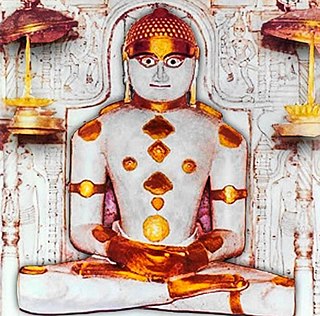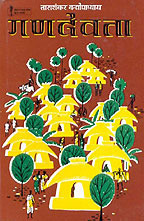Jainism, also known as Jain Dharma, is an Indian religion. Jainism traces its spiritual ideas and history through the succession of twenty-four tirthankaras, with the first in the current time cycle being Rishabhadeva, whom the tradition holds to have lived millions of years ago, the twenty-third tirthankara Parshvanatha, whom historians date to the 9th century BCE, and the twenty-fourth tirthankara Mahavira, around 600 BCE. Jainism is considered an eternal dharma with the tirthankaras guiding every time cycle of the cosmology. The three main pillars of Jainism are ahiṃsā (non-violence), anekāntavāda (non-absolutism), and aparigraha (asceticism).

Rasipuram Krishnaswami Iyer Narayanaswami, better known as R. K. Narayan, was an Indian writer and novelist known for his work set in the fictional South Indian town of Malgudi. He was a leading author of early Indian literature in English along with Mulk Raj Anand and Raja Rao.

Chandragupta Maurya was the founder of the Maurya Empire, a geographically-extensive empire based in Magadha. He reigned from 320 BCE to 298 BCE. The Magadha kingdom expanded to become an empire that reached its peak under the reign of his grandson, Ashoka the Great, from 268 BCE to 231 BCE. The nature of the political formation that existed in Chandragupta's time is not certain. The Mauryan empire was a loose-knit one with large autonomous regions within its limits.

Mahavira, also known as Vardhamana, was the 24th Tirthankara of Jainism. He was the spiritual successor of the 23rd Tirthankara Parshvanatha. Mahavira was born in the early 6th century BCE to a royal Jain family of ancient India. His mother's name was Trishala and his father's name was Siddhartha. They were lay devotees of Parshvanatha. Mahavira abandoned all worldly possessions at the age of about 30 and left home in pursuit of spiritual awakening, becoming an ascetic. Mahavira practiced intense meditation and severe austerities for twelve and a half years, after which he attained Kevala Jnana (omniscience). He preached for 30 years and attained moksha (liberation) in the 6th century BCE, although the year varies by sect.

Bimbisāra or རྒྱལ་པོ་གཟུགས་ཅན་སྙིང་པོ་ (Tibetan) or Shrenika and Seniya in the Jain histories was the King of Magadha and belonged to the Haryanka dynasty. He was the son of Bhattiya. His expansion of the kingdom, especially his annexation of the kingdom of Anga to the east, is considered to have laid the foundations for the later expansion of the Mauryan Empire.

In Jainism, a Tirthankara is a saviour and supreme spiritual teacher of the dharma. The word tirthankara signifies the founder of a tirtha, a fordable passage across saṃsāra, the sea of interminable birth and death. According to Jains, tirthankaras are the supreme preachers of dharma, who have conquered saṃsāra on their own and made a path for others to follow. After understanding the true nature of the self or soul, the Tīrthaṅkara attains kevala jnana (omniscience). A Tirthankara provides a bridge for others to follow them from saṃsāra to moksha (liberation).

The Jnanpith Award is the oldest and the highest Indian literary award presented annually by the Bharatiya Jnanpith to an author for their "outstanding contribution towards literature". Instituted in 1961, the award is bestowed only on Indian writers writing in Indian languages included in the Eighth Schedule to the Constitution of India and English, with no posthumous conferral.

Parshvanatha, or Pārśva and Pārasanātha, was the 23rd of 24 Tirthankaras of Jainism. He gained the title of Kalīkālkalpataru.
Anekāntavāda is the Jain doctrine about metaphysical truths that emerged in ancient India. It states that the ultimate truth and reality is complex and has multiple aspects.

Tattvārthasūtra, meaning "On the Nature [artha] of Reality [tattva]" is an ancient Jain text written by Acharya Umaswami in Sanskrit, sometime between the 2nd- and 5th-century CE.

Jain vegetarianism is practised by the followers of Jain culture and philosophy. It is one of the most rigorous forms of spiritually motivated diet on the Indian subcontinent and beyond. The Jain cuisine is completely lacto-vegetarian and also excludes root and underground vegetables such as potato, garlic, onion etc., to prevent injuring small insects and microorganisms; and also to prevent the entire plant getting uprooted and killed. It is practised by Jain ascetics and lay Jains.

Rishabhanatha, also Rishabhadeva, Rishabha or Ikshvaku, is the first tirthankara of Jainism. He was the first of twenty-four teachers in the present half-cycle of time in Jain cosmology, and called a "ford maker" because his teachings helped one cross the sea of interminable rebirths and deaths. The legends depict him as having lived millions of years ago. He was the spiritual successor of Sampratti Bhagwan, the last Tirthankar of previous time cycle. He is also known as Ādinātha, as well as Adishvara, Yugadideva, Prathamarajeshwara and Nabheya. He is also known as Ikshvaku, establisher of Ikshvaku dynasty. Along with Mahavira, Parshvanath, Neminath, and Shantinath, Rishabhanatha is one of the five Tirthankaras that attract the most devotional worship among the Jains.
Pather Panchali is a 1929 novel written by Bibhutibhushan Bandyopadhyay and was later adapted into a 1955 film of the same name by Satyajit Ray. Considered to be one of the greatest literary works describing rural life, Pather Panchali deals with the life of the Roy family, both in their ancestral village in rural Bengal and later when they move to Varanasi in search of a better life, as well as the anguish and loss they face during their travels.

Chunilal Madia was a Gujarati author from Gujarat, India, primarily known for his novels and short stories set in rural Saurashtra. Recipients of several awards, he is considered one of the leading writers of Gujarati literature.
Jainism and Hinduism are two ancient Indian religions. There are some similarities and differences between the two religions. Temples, gods, rituals, fasts and other religious components of Jainism are different from those of Hinduism.
Muni Jinvijayji was a scholar of orientalism, archeology, indology and Jainism from India.

Madhu Rye is a Gujarati playwright, novelist and story writer. Born in Gujarat and educated at Calcutta, he started writing in the 1960s and became known for his stories and plays. His experience at the University of Hawaii introduced him to experimental writing and improvisations as writing aid, which later led to a movement against absurd theatre. He moved to the US in 1974 and has lived there since. He chiefly wrote novels, short stories and plays. His plays were successful and have been adapted into several languages and media. He has adapted his novels into plays and some plays into novels. The most notable is Kimball Ravenswood, which was loosely adapted into a Hindi TV series Mr. Yogi (1989), and a Hindi film, What's Your Rashee? (2009).
Krishna Lal Chadha is an Indian horticultural scientist, author and a former National Professor of the Indian Council of Agricultural Research. He was honored by the Government of India, in 2012, with the fourth highest Indian civilian award of Padma Shri.

Adarsha Hindu Hotel is a Bengali novel written by Bibhutibhushan Bandyopadhyay. The novel was first published in 1940.













